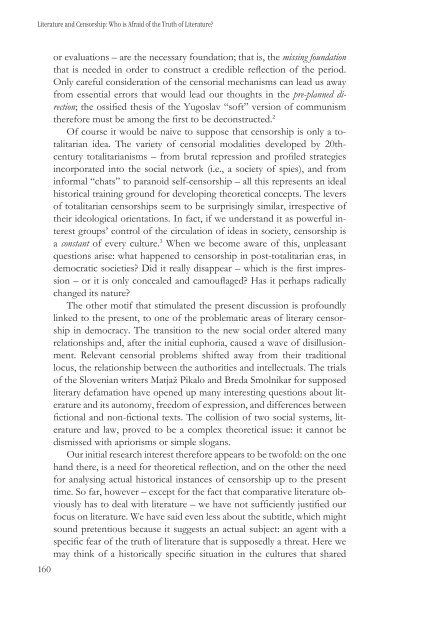Literatura in cenzura - Društvo za primerjalno književnost - ZRC SAZU
Literatura in cenzura - Društvo za primerjalno književnost - ZRC SAZU
Literatura in cenzura - Društvo za primerjalno književnost - ZRC SAZU
- No tags were found...
Create successful ePaper yourself
Turn your PDF publications into a flip-book with our unique Google optimized e-Paper software.
Literature and Censorship: Who is Afraid of the Truth of Literature?160or evaluations – are the necessary foundation; that is, the miss<strong>in</strong>g foundationthat is needed <strong>in</strong> order to construct a credible reflection of the period.Only careful consideration of the censorial mechanisms can lead us awayfrom essential errors that would lead our thoughts <strong>in</strong> the pre-planned direction;the ossified thesis of the Yugoslav “soft” version of communismtherefore must be among the first to be deconstructed. 2Of course it would be naive to suppose that censorship is only a totalitarianidea. The variety of censorial modalities developed by 20thcenturytotalitarianisms – from brutal repression and profiled strategies<strong>in</strong>corporated <strong>in</strong>to the social network (i.e., a society of spies), and from<strong>in</strong>formal “chats” to paranoid self-censorship – all this represents an idealhistorical tra<strong>in</strong><strong>in</strong>g ground for develop<strong>in</strong>g theoretical concepts. The leversof totalitarian censorships seem to be surpris<strong>in</strong>gly similar, irrespective oftheir ideological orientations. In fact, if we understand it as powerful <strong>in</strong>terestgroups’ control of the circulation of ideas <strong>in</strong> society, censorship isa constant of every culture. 3 When we become aware of this, unpleasantquestions arise: what happened to censorship <strong>in</strong> post-totalitarian eras, <strong>in</strong>democratic societies? Did it really disappear – which is the first impression– or it is only concealed and camouflaged? Has it perhaps radicallychanged its nature?The other motif that stimulated the present discussion is profoundlyl<strong>in</strong>ked to the present, to one of the problematic areas of literary censorship<strong>in</strong> democracy. The transition to the new social order altered manyrelationships and, after the <strong>in</strong>itial euphoria, caused a wave of disillusionment.Relevant censorial problems shifted away from their traditionallocus, the relationship between the authorities and <strong>in</strong>tellectuals. The trialsof the Slovenian writers Matjaž Pikalo and Breda Smolnikar for supposedliterary defamation have opened up many <strong>in</strong>terest<strong>in</strong>g questions about literatureand its autonomy, freedom of expression, and differences betweenfictional and non-fictional texts. The collision of two social systems, literatureand law, proved to be a complex theoretical issue: it cannot bedismissed with apriorisms or simple slogans.Our <strong>in</strong>itial research <strong>in</strong>terest therefore appears to be twofold: on the onehand there, is a need for theoretical reflection, and on the other the needfor analys<strong>in</strong>g actual historical <strong>in</strong>stances of censorship up to the presenttime. So far, however – except for the fact that comparative literature obviouslyhas to deal with literature – we have not sufficiently justified ourfocus on literature. We have said even less about the subtitle, which mightsound pretentious because it suggests an actual subject: an agent with aspecific fear of the truth of literature that is supposedly a threat. Here wemay th<strong>in</strong>k of a historically specific situation <strong>in</strong> the cultures that shared
















